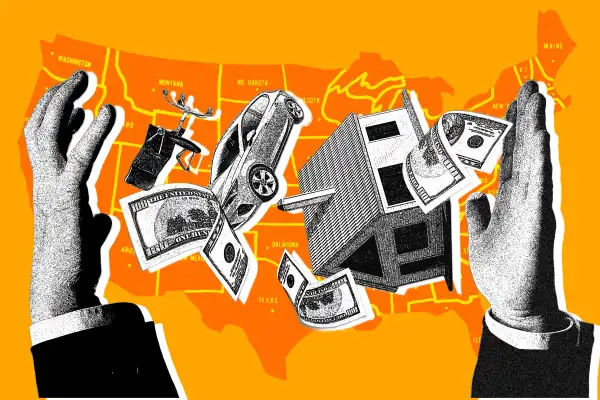These Are the 10 Most Tax-Friendly States in the U.S.

After years of stubborn inflation and rising housing costs, the question of where your money goes the furthest has taken on new urgency — and state taxes can make a big difference.
A new analysis from the Tax Foundation’s 2026 State Tax Competitiveness Index offers a detailed look at how each state’s tax system affects residents and businesses — ranking them based on more than 150 variables within five tax categories, including corporate, individual income, sales and excise, property and wealth and unemployment insurance.
“The index measures tax structure, not all the other things businesses care about, like an educated workforce, quality of life, proximity to relevant markets or even the weather — and some of these things involve trade-offs,” the Tax Foundation, a Washington, D.C.-based think tank, said in the report.
“Taxes, however, are an important part of the mix, and modernizing a state’s tax structure helps position it for growth. States that rank better on the Index have better-structured tax codes, and states with better-structured tax codes get Wins Above Replacement.”
Wins Above Replacement, or WAR, is a baseball term that measures how many more wins a player contributes compared with a replacement-level player. In this analogy, a well-structured tax code is like the star player, giving a state an edge over what it would get with a mediocre or poorly structured one.
One clear pattern stands out among the top-ranked tax-friendly states: Many forgo at least one major tax — such as individual income tax, corporate income tax or state-level sales tax — even though all still levy property and unemployment insurance taxes.
For instance, South Dakota and Wyoming don't levy either a corporate or an individual income tax. Alaska and New Hampshire have neither an individual income tax nor a state-level sales tax. Florida, Tennessee and Texas have no individual income tax. And Montana has no sales tax.
That said, a state doesn’t need to eliminate major taxes to rank well. States like Idaho and Indiana still levy all five main taxes — income, sales, corporate, property and unemployment insurance — yet they rank 9th and 10th, respectively.
Idaho, in particular, climbed the rankings this year by implementing a series of tax reforms, including reducing its flat individual and corporate income tax rates. Those changes helped boost the state two spots on the index, from 11th to 9th overall.
Here’s a look at the 10 states that ranked highest on the 2026 State Tax Competitiveness Index:
1. Wyoming
- Individual income tax rank: 1st (tie)
- Sales tax rank: 6th
- Property tax rank: 37th
2. South Dakota
- Individual income tax rank: 1st (tie)
- Sales tax rank: 31st
- Property tax rank: 8th
3. New Hampshire
- Individual income tax rank: 1st (tie)
- Sales tax rank: 1st
- Property tax rank: 44th
4. Alaska
- Individual income tax rank: 1st (tie)
- Sales tax rank: 5th
- Property tax rank: 31st
5. Florida
- Individual income tax rank: 1st (tie)
- Sales tax rank: 16th
- Property tax rank: 20th
6. Montana
- Individual income tax rank: 12th
- Sales tax rank: 3rd
- Property tax rank: 17th
7. Texas
- Individual income tax rank: 1st (tie)
- Sales tax rank: 36th
- Property tax rank: 38th
8. Tennessee
- Individual income tax rank: 1st (tie)
- Sales tax rank: 47th
- Property tax rank: 32nd
9. Idaho
- Individual income tax rank: 14th
- Sales tax rank: 8th
- Property tax rank: 3rd
10. Indiana
- Individual income tax rank: 20th
- Sales tax rank: 14th
- Property tax rank: 4th
Lowest-ranked states
At the other end, the 10 lowest-ranked states — Hawaii, Vermont, Massachusetts, Minnesota, Washington, Maryland, Connecticut, California, New Jersey and New York — tend to combine high tax rates with complex tax structures, reducing financial flexibility for taxpayers.
Take New Jersey, for example, where residents and businesses face some of the nation's steepest taxes. It has one of the highest corporate income tax rates (with rates ranging from 6.5% to 11.5%), one of the highest individual income tax rates and some of the highest property taxes in the country.
On top of that, the Garden State taxes international income aggressively, imposes an inheritance tax and has a complicated system for calculating individual income taxes.
Here's a snapshot of the lowest-ranked states in this year's index:
41. Hawaii
- Individual income tax rank: 45th
- Sales tax rank: 29th
- Property tax rank: 15th
42. Vermont
- Individual income tax rank: 39th
- Sales tax rank: 30th
- Property tax rank: 50th
43. Massachusetts
- Individual income tax rank: 42nd
- Sales tax rank: 22nd
- Property tax rank: 48th
44. Minnesota
- Individual income tax rank: 44th
- Sales tax rank: 35th
- Property tax rank: 23rd
45. Washington
- Individual income tax rank: 31st
- Sales tax rank: 49th
- Property tax rank: 25th
46. Maryland
- Individual income tax rank: 47th
- Sales tax rank: 40th
- Property tax rank: 36th
47. Connecticut
- Individual income tax rank: 46th
- Sales tax rank: 19th
- Property tax rank: 49th
48. California
- Individual income tax rank: 49th
- Sales tax rank: 46th
- Property tax rank: 27th
49. New Jersey
- Individual income tax rank: 48th
- Sales tax rank: 34th
- Property tax rank: 42nd
50. New York
- Individual income tax rank: 50th
- Sales tax rank: 42nd
- Property tax rank: 47th
More from Money:
IRS Officially Kills Direct File, a 'Failed' Program That Offered Millions Free Tax Prep
Why Millions of Taxpayers Could Get Bigger Refunds Next Year




